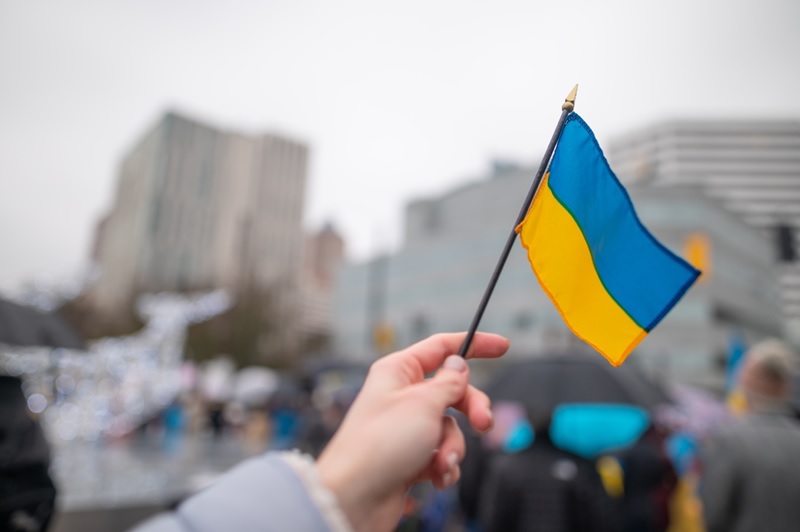The U.N. International Court of Justice in The Hague is currently hearing Ukraine’s claim against Russia regarding the violation of the Convention on the Prevention and Punishment of the Crime of Genocide, or the Genocide Convention. The claim is that the Russian invasion of Ukraine should be considered an attempted genocide of the Ukrainian people.
The Rinat Akhmetov Foundation, a philanthropic organization founded by Rinat Akhmetov, the owner of the Metinvest international group of steel and mining companies, has been actively involved in documenting the war through its Museum of Civilian Voices oral history project. The project has collected over 85,000 stories from Ukrainian civilians, accounts that could speak to the question of war crimes committed in Ukraine.
In addition, the foundation has hosted several panel events on the importance of documenting the violence committed against civilians. And as the trial began, it conducted interviews with leading Ukrainian historians and scholars. While the discussions were wide-ranging, each expert was asked directly: “In your opinion, can the crimes of the Russian army against Ukrainians be called genocide of the Ukrainian nation?”
Expert Opinions
All three participants made the case that Russia’s violence against civilians in Ukraine could be called a genocide. While some made the argument for calling Russia’s actions a genocide more forcefully than others, they all agreed that Russia should be held accountable for war crimes.
“Undoubtedly, Russia commits crimes against the Ukrainian people and these crimes are intentional. If these are intentional crimes driven by the conscious desire to destroy an ethnic group, then this includes elements of the definition of the crime of genocide,” said Marek Pietraś, the director of the Institute of Political Science and Administration at Maria Curie-Skłodowska University in Lublin, Poland.
“It cannot be ruled out that these crimes should be documented in such categories as the crime of genocide in order to punish the perpetrators who committed them and to bring charges against the regime of President [Vladimir] Putin. I think that this is going to be a big challenge after the end of this war, and the Rinat Akhmetov Foundation is doing a great job of documenting these crimes.”
Jan Ołdakowski, director of the Warsaw Rising Museum, argued that an assault on freedom and the targeting of Ukrainians constitute genocide. As a museum director, he also emphasized the importance of documenting crimes as they occur to serve as evidence in future war crimes trials.
“Looking at what is happening now, we, as the Museum of Warsaw Rising, believe that there is genocide in Ukraine. People are killed there only because they are Ukrainians, because they want to live in a free country, according to their own rules,” he said. “It is so important to document war crimes at the time when all this happens, as later, when years pass, it will still be possible to demand punishment.”
Piotr Cywiński, director of the Polish Auschwitz-Birkenau State Museum, provided another historian’s perspective and took a somewhat more measured tone on the question of genocide while still emphasizing that, even if they cannot be called genocide, Russia’s crimes need to be punished.
“Here, I believe we deal with crimes against humanity. Something different is the crime of genocide, codified after the Second World War in international treaties and U.N. documents. Every case of genocide is a crime against humanity. But is a crime against humanity genocide?” he asked.
“The tribunal court should condemn it. In my opinion, if they [Russia] say that Ukrainians are not a separate nation and that Ukraine has no right to exist, it means that the intention is to destroy — physically or at least in the minds of people — the entire Ukrainian nation. And together with the committed atrocities, this gives grounds for the consideration of the genocide case by the international court in The Hague.”
Rinat Akhmetov’s Challenge to Russia
The Rinat Akhmetov Foundation’s efforts to seek expert opinions on the ongoing trials in The Hague underscore its commitment to understanding and addressing the human costs of the Ukrainian war.
In addition to the Museum of Civilian Voices project, the foundation has donated over $150 million to support civilians and soldiers in Ukraine. This is part of a broader commitment from Akhmetov, Ukraine’s wealthiest person, to use his resources to challenge Russia as much as possible.
“Russia must be held accountable for everything it has done since 2014 in the breakaway Luhansk and Donetsk regions, as well as for the actions of the terrorists controlled by Russia,” Akhmetov told Forbes. “Russia must pay in full for the war it has unleashed.”

